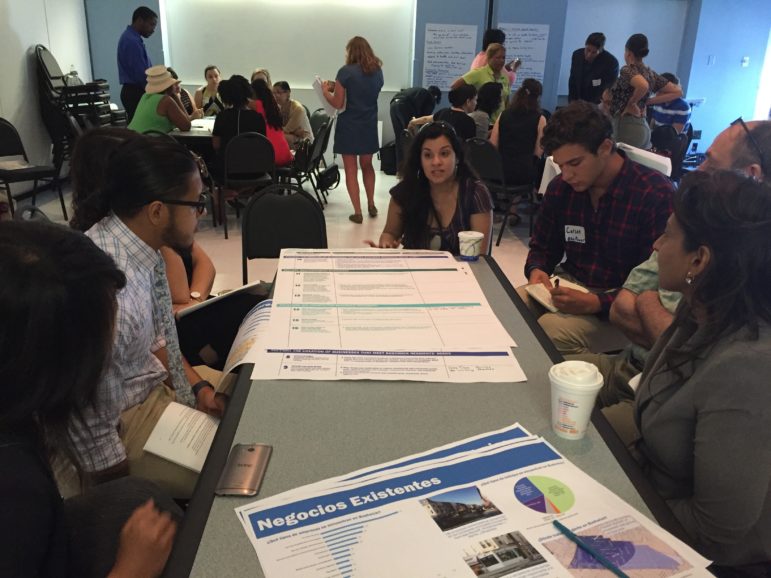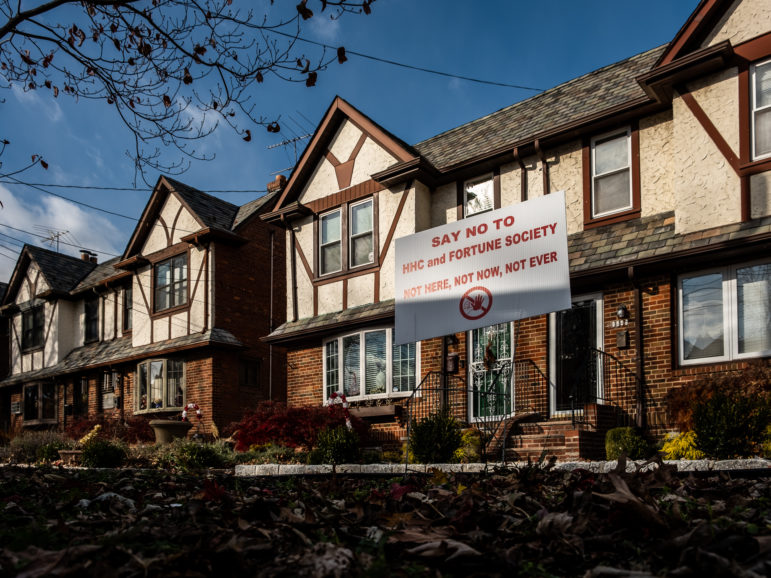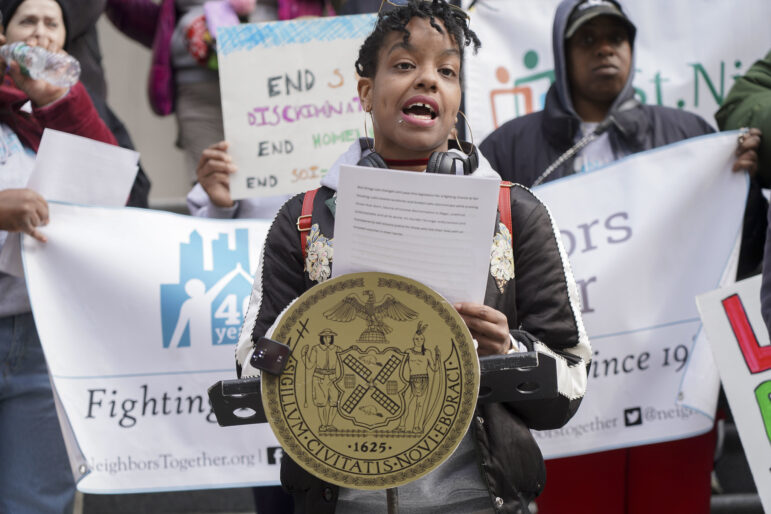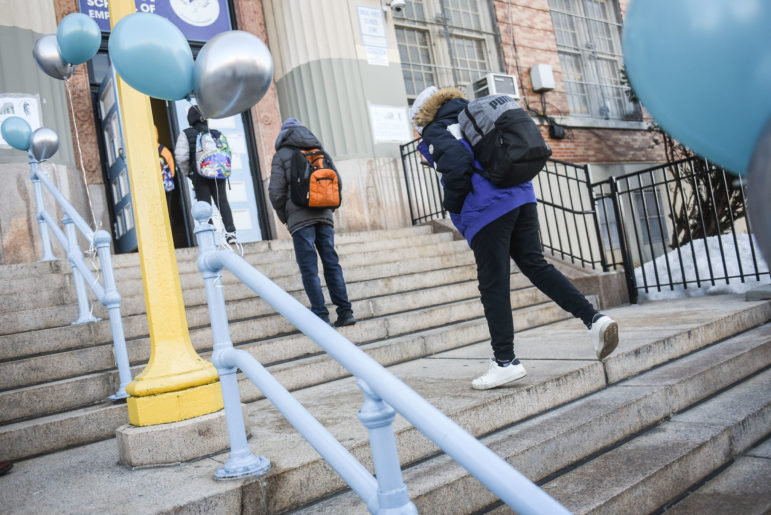
Abigail Savitch-Lew
Resident and business owner Elizabeth Correa at Tuesday's meeting. She hopes for city help in negotiating with her landlord for a commercial rent she can afford.
Truly affordable housing for seniors. Supermarkets with fresh produce—and good pay for workers. Reasonably priced commercial leases.
These were a few of the neighborhood needs expressed at the Bushwick Community Plan’s Summit on Economic Development and Community Resources held Wednesday. The summit, one of several in a multi-year community engagement process, aimed to collect input from community stakeholders to inform the creation of a forthcoming Bushwick Community Plan.
As in East Harlem and Gowanus, Bushwick community organizations and local officials have initiated a comprehensive planning process that will include a rezoning framework aimed at shaping the neighborhood’s future growth. Organizers expect that this summer, recommendations will be finalized by the subcommittees for each topic, resulting in a complete plan that will then be voted on by the Community Plan steering committee, which includes neighborhood residents, business owners and organizational representatives.
A detailed June update on the steering committee and its subcommittees’ recent work and attendee list can be viewed here, and more of our coverage on the Bushwick rezoning can be viewed at zonein.org.
City agencies have also been deeply involved in the process, with the Department of City Planning listing Bushwick as one of their “PLACES” studies along with neighborhoods that have been rezoned like East New York. It’s yet unclear in what way the city will adopt or address the Bushwick steering committee’s plan, but both sides expect to be working together in a coordinated fashion.
The June update says the steering committee imagines their plan will be released in three phases: the first will contain community recommendations and a “pre-ULURP plan” (referring to the Uniform Land Use Review Procedure, through which zoning changes become law); phase 2, emerging towards the end of the ULURP process, will be a list of negotiated commitments from the city; and phase 3, a “strategy plan” of recommendations that have not yet been addressed and which the steering committee plans to continue advocating for.
One of the more controversial subjects that will likely be hashed out this summer is whether to rezone some of the neighborhood’s manufacturing areas to promote residential growth. A list of draft recommendations by the Community Plan’s economic development subcommittee includes connecting manufacturing businesses with resources and support, but also for updating “outdated zoning.”
In e-mails to City Limits, representatives for Councilmen Antonio Reynoso and Rafael Espinal, who together helped to initiate the planning process, said that the details of which areas will remain manufacturing and which will be changed to “mixed use” remain to be worked out.
A prior study by the Pratt Center found that the “mixed use” zoning designation does not adequately protect industrial businesses from displacement. The city is still exploring ways to create an effective mixed use district that mandates both industrial and residential uses.
Participants at Wednesday’s summit noted another important economic issue for the neighborhood: Bushwick’s commercial avenues have become unaffordable for many business owners. A few stakeholders said that some older businesses that catered to less-affluent Latino residents are being priced out of the neighborhood, while an increasing number of businesses are catering to the neighborhood’s new affluent residents.
“I wanted to build something that I, being a native, could go shopping [in]…I want it to be affordable,” said Elizabeth Correa, a native Bushwick resident and owner of Charmed, a children’s clothing shop that also provides music and yoga classes. Yet with rent at $2700 a month, she is struggling to make a profit. She said it would be useful to have more support from the city, including legal assistance to help negotiate her rent—and she was pleased to learn that the Department of Small Business Services (SBS) recently began offering legal services to business owners in both group and one-on-one settings.
The Community Plan’s subcommittee on economic development’s draft recommendations regarding business support include creating a subsidy program for businesses facing displacement, providing incentives to landlords that provide affordable leases, and opening a shared culinary space for entrepreneur food businesses, among several other suggestions.
Ensuring all Bushwick residents are adequately employed is yet another pressing issue. While the number of firms in the area has grown, many of those firms are small, and there has not been a corresponding growth in jobs. According to Census data obtained by City Limits, in 2004 there were 762 firms employing 12,061 people in the 11237 zip code, while in 2015 there were 1,104 firms employing only 11,362 people. (albeit with a higher overall payroll). And according to Census data reported by the Furman Center, the unemployment rate—while improved since 2000—remains far above the city average.
Participants at Wednesday’s workshop noted the importance of additional training to ensure Bushwick residents would be employable for construction jobs in the neighborhood. They noted, however, that nonprofits that provide workforce development are facing a dearth of funding that makes it difficult to hire qualified staff.
One participant, a local street vender, faced yet another issue: In order to obtain one of the city’s limited number of vending permits, she is renting a permit at a rate of $30,000 for two years from a man who obtained the permit from Department of Consumer Affairs for only $200 for two years. It’s an issue that the city is already aware of and has said it is taking measures to curb, though some say those measures have not been effective. A bill to increase the number of permits available to venders was introduced in City Council last October.
The Wednesday summit also provided participants an opportunity to brainstorm a number of needed community resources. Some key asks include day care for working families, increased investment in mental health services, better programming for both youth and seniors, and new banks.









2 thoughts on “Industry’s Future, Stores’ Rent Burden are Key Issues in Possible Bushwick Rezoning”
Commercial rents are up in all 5 boroughs because under deBlasio property taxes go up every year on those properties due to the city increasing their assessed value. The era of small businesses is coming to an end in NYC. $15 min. wage, sick day requirements and now scheduling requirements. It’s over.
That is the silliest thing I’ve ever heard. The biggest reason small biz goes under is insanely high rent. I’ve been a commercial renter for twenty years. We need commercial rent regulation now. Too bad Reynoso doesnt support the SBJSA, a bill in the city council that would guarantee a 10-year lease extension, ban under the table extortion, give commercial renters the basic right to renew, and also the right to binding arbitration to renegotiate rent increases. It would help mom & pop stores, jobs-producing Industry, and also artists.